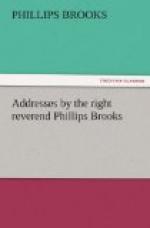strange it very often seems that men go to the Church,
or to one another, and say: “Must I believe
this doctrine in order that I can enter into the Church?”
“Must I believe this doctrine in order that
I may be saved?” men say, with a strange sort
of notion about what salvation is. How strange
it seems, when we really have got our intelligence
about us and know what it is to believe! To believe
a new truth, if it be really truth and we really believe
it, is to have entered into a new region, in which
our life shall find a new expansion and a new youth.
Therefore, not “Must we believe?” but “May
I believe?” is the true cry of the human creature
who is seeking for the richest fulfilment of his life,
who is working that his whole nature may find its
complete expansion and so its completest exercise.
We talk a great deal in these days and in this place
about a liberal faith. What is a liberal faith,
my friends? It seems to me that by every true
meaning of the word, by every true thought of the idea,
a liberal faith is a faith that believes much, and
not a faith that believes little. The more a
man believes, the more liberally he exercise his capacity
of faith, the more he sends forth his intelligence
into the mysteries of God, the more he understands
those things which God chooses to reveal to his creatures,
the more liberally he believes. Let yourselves
never think that you grow liberal in faith by believing
less; always be sure that the true liberality of faith
can only come by believing more. It is true,
indeed, that as soon as a man becomes eager for belief,
for the truth of God and for the mysteries with which
God’s universe is filled, he becomes all the
more critical and careful. He will hot any longer,
if he were before, be simply greedy of things to believe,
so that if any superstition comes offering itself
to him he will not gather it in indiscriminately and
believe it without evidence, without examination.
He becomes all the more critical and careful, the more
he becomes assured that belief, and not unbelief,
is the true condition of his life. The truth
that God has entered into this world in wondrous ways
and filled its life with Jesus Christ, the truth that
man has a soul and not simply a body, that he has
a spiritual need, that God cares for him and he is
to care for himself, that there is an immortal life,
and that that which we call faith is but the opening
of a gate, the pushing back of a veil,—shall
a man believe those things as imprisonments of his
nature, and shall it not make him larger? Shall
it not be the indulgence of his life when he enters
into the great certainties which so are offered to
his belief, believing them in his own way? Let
us always feel that to accept a new belief is no to
build a wall beyond which we cannot pass, but is to
open the door to a great fresh, free region, in which
our souls are to live. And just so it is when
we come to the moral things of life. The man
puts aside some sinfulness. He breaks down the




